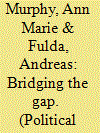|
|
|
Sort Order |
|
|
|
Items / Page
|
|
|
|
|
|
|
| Srl | Item |
| 1 |
ID:
105380


|
|
|
|
|
| Publication |
2011.
|
| Summary/Abstract |
In his seminal work Bridging the Gap: Theory and Practice in Foreign Policy, Alexander George (1993) lamented the great divide between academia and the foreign policymaking community, arguing that greater interaction between scholars and policymakers would produce better policy. We share George's belief that scholars and practitioners each have much to offer the other. In fact, a wide spectrum of opportunities exists for scholars in the field of political science to engage in meaningful public service that can enhance every aspect of their careers, as well as contribute to international understanding.
|
|
|
|
|
|
|
|
|
|
|
|
|
|
|
|
| 2 |
ID:
164579


|
|
|
|
|
| Summary/Abstract |
This analysis considers the phenomenon of citizen diplomacy in European Union [EU]–China relations. It begins by engaging with the global discourse about “new” diplomacy and outlines how society-centric citizen diplomacy differs from state-centric public diplomacy. After revealing that European policy-makers are only reluctantly acknowledging the role of laymen in foreign policy-making vis-à-vis China, it shows that whilst citizen diplomacy may be a new concept in EU–China relations, it is actually not a new practice. The empirical part of the exegesis traces the experiential learning amongst 12 European citizen diplomats who have engaged China in the activity fields of disability; psychoanalysis; non-governmental organisation twinning; human rights; climate change mitigation; welfare of orphans, abandoned disabled children and young people; youth dialogue; public participation; animal welfare; and inclusive performing arts. The final part makes use of the newly developed hexagon of intercultural communication and collaboration competence to reveal how the European citizen diplomats have managed to navigate the sometimes-treacherous political-administrative landscape in mainland China. European citizen diplomats have made manifold and often surprising contributions to China’s multifaceted development.
|
|
|
|
|
|
|
|
|
|
|
|
|
|
|
|
| 3 |
ID:
112834


|
|
|
|
|
| Publication |
2012.
|
| Summary/Abstract |
Since the turn of the millennium, a second generation of Chinese civil society organisations (CSOs) have started taking on issues such as rural migrant integration, social service provision, as well as community building. Organisations such as Beijing-based Shining Stone Community Action (SSCA) can be seen as the avant-garde of a second wave of humanistic, community-based CSOs which are willing to help improve the strained state-society relationship in the People's Republic of China (PR China). In order to advance their values and interests, civil society practitioners are willing to engage with Chinese government officials. By gaining the trust of First-in-Command (FIC) cadres they manage to introduce ideas such as the principle of subsidiarity, solidarity and reciprocity. Civil society practitioners thereby initiate open-ended processes of communication, consultation and cooperation. Such processes help promote cross-sector collaboration between Chinese civil society organisations and local government agencies. These developments signify an incremental change from government control (guanzhi) to public management (guanli) and to network governance (zhili). As a framework for the case study the authors look at strategies for the establishment of cooperative relations, focusing on steering mechanisms and process factors. In order to further understand the dynamics of cross-sector collaboration they further explore the social capital dimensions of the principle of reciprocity and trust. To evaluate outcomes and impacts of cross-sector collaboration, the authors discuss the ability of collaboration partners to produce tangible results and to innovate. The findings show that successful experiments with cross-sector collaboration not only depend on structural factors but also on the skills and strategies of the individuals and organisations involved.
|
|
|
|
|
|
|
|
|
|
|
|
|
|
|
|
| 4 |
ID:
172278


|
|
|
|
|
| Summary/Abstract |
How should survival strategies of resource-dependent Chinese civil society organisations (CSOs) be re-conceptualised in order to narrow the gap between civil society research and emerging CSO practices? Specifically, to what extent have CSOs managed to leverage scarce resources to secure organisational survival? Drawing on Bourdieu's concepts, the authors engage in theoretical innovation by explaining how CSOs have engaged in a resource mobilisation cycle, whereby practitioners draw on their cultural, economic, symbolic and social capital. Their findings highlight the view that Chinese CSOs have varying levels of access to support their work from four resource pools, namely global civil society, the Party–state, the private sector, and local constituents and local communities.
|
|
|
|
|
|
|
|
|
|
|
|
|
|
|
|
|
|
|
|
|